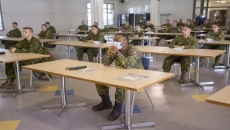VICTORIA - Canada's provinces and territories need a partner that will share half the financial load on the health-care system, which is buckling without long-term and sustainable funding, British Columbia Premier John Horgan says.
We need action now - to make sure people get the health care they need when they need it.https://t.co/A9awpA9WwG
— John Horgan (@jjhorgan) July 11, 2022
The country's 13 premiers began two days of meetings in Victoria on Monday with the primary topic of health-care funding as Canada eases out of a pandemic with a severe shortage of doctors, nurses and other health workers.
Horgan, who chairs the Council of the Federation of premiers, said they've already sent the federal government a detailed funding proposal and are waiting to hear back.
He received a text from Prime Minister Justin Trudeau on Monday saying Ottawa is aware of the funding situation and is working on a response, Horgan said.
"But we can’t determine what we’re going to do with money we don’t have," he said.
"And we can go a lot further if we had a partner that was carrying half the load," Horgan said, noting that was the history of health-care funding in Canada before cuts began in the 1990s.
The premiers have called on Ottawa to increase health funding to 35 per cent, from 22 per cent.
"We need to reimagine public health care in Canada," Horgan said.
Stable, increased funding would allow jurisdictions to invest in a human resource strategy so they aren't poaching from each other as they train the next generation of health-care workers to take the burden off those who were celebrated during the pandemic, Horgan said.
"It’s just not good enough to show our gratitude. We need to now show we’re committed to those workers, those patients, and that’s what these discussions are about this afternoon and into tomorrow."
Canadian nursing leaders also met with premiers earlier Monday with a message that nurses are suffering through a "dire staffing crisis" that threatens the sustainability of public health care.
A statement from Linda Silas, president of the Canadian Federation of Nurses Unions, said the system is "on the brink of disaster."
Silas said nurses have been "struggling through extreme staffing shortages, forced overtime and cancelled vacations, with no end in sight" to untenable conditions.
The federation said its proposals focus on retaining nurses, encouraging them to return to the profession and bringing in new measures to recruit and train more of them.
Silas said provincial commitments to strengthen health care are welcome, but "no one province or territory can solve this on their own," and federal funding will be key.
Premiers also met with leaders of the National Indigenous Organizations, made up of the Assembly of First Nations, Congress of Aboriginal Peoples, Inuit Tapiriit Kanatami, Métis National Council and the Native Women's Association of Canada.
Horgan said they discussed issues like land claims, reconciliation, missing and murdered women as well as the "archaic" Indian Act, which was introduced when residential school policies were being developed across Canada.
Lisa Weber of the Native Women's Association of Canada said it was made clear to her that premiers were committed to getting measurable outcomes for Indigenous women, children and families.
Meanwhile, Alberta Premier Jason Kenney said he will be speaking at the meeting about the federal government's emissions reduction plan.
He said the reduction plan is "pie in the sky" and a "ridiculous" target with no proper strategy for implementation.
Kenney, who made the comments at the Calgary Stampede's annual breakfast on Monday, said the implications of the plan would be devastating for Alberta just as the world needs more of its energy resources.
The federal plan released earlier this year is aimed at capping oil and gas sector emissions to achieve net-zero emissions by 2050 and reduce oil and gas methane emissions by at least 75 per cent by 2030.






